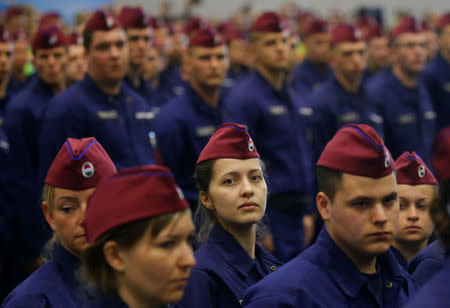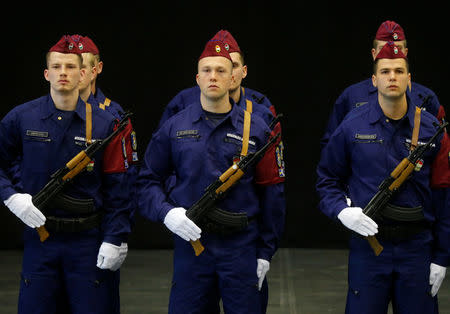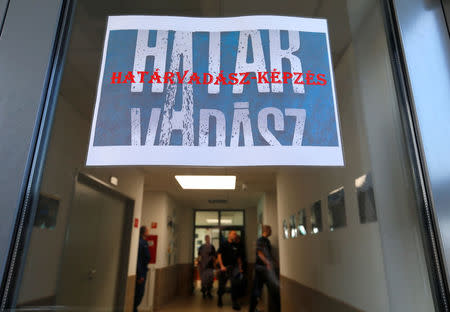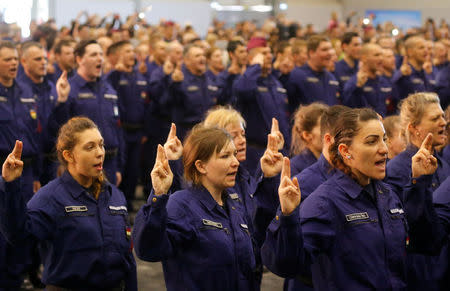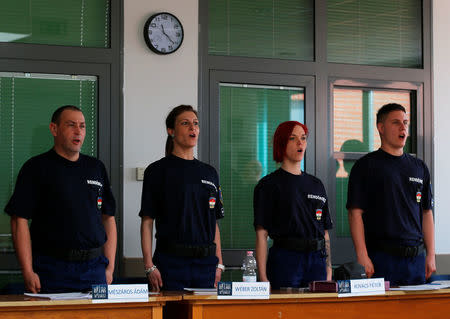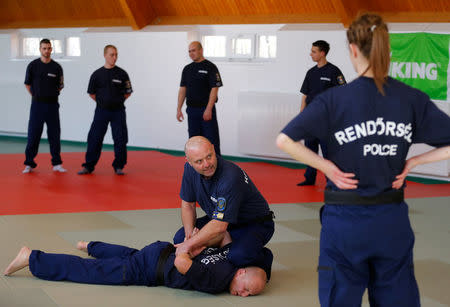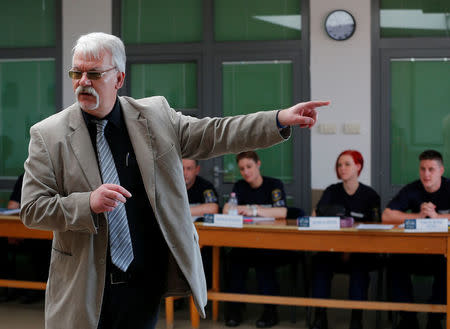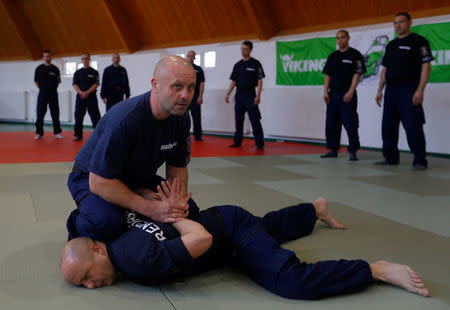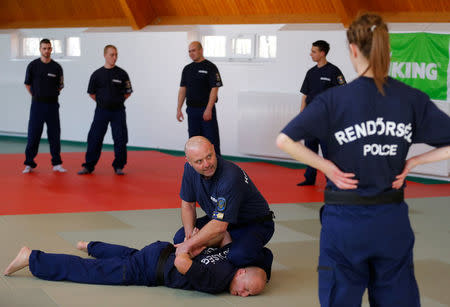Hungary to arm new 'border hunters' after six-month crash course
By Krisztina Than BARCS, Hungary (Reuters) - Sandor Jankovics is proud to be joining Hungary's new "border hunter" force after a six-month crash course to help police and army units keep out migrants, part of a security clampdown that has raised human rights concerns. Hungary's southern border with Serbia and Croatia marks the external edge of the European Union's Schengen zone of passport-free travel. Hundreds of thousands of migrants have entered Hungary via its southern frontier since 2015, though most have moved on westward to more prosperous parts of the EU. The migrant flow has ebbed greatly since Hungary erected a fence along the southern boundary and the EU struck a deal with Turkey 18 months ago that curbed migration from that country into neighbouring Europe. But nationalist Hungarian Prime Minister Viktor Orban, who on Tuesday described mainly Muslim migrants as a "Trojan horse for terrorism", has cited the risk of a new influx from the Balkans and is beefing up his country's defences. This week Hungary also passed a law to detain migrants in camps along its border, a step the United Nations said violates EU humanitarian law and will have a "terrible physical and psychological impact" on asylum seekers. Jankovic, 26, who quit his job as a labourer in nearby Austria last year, will start "border hunter" duty along with almost 1,000 other volunteers within three months. He is one of dozens undergoing fast-track training at Barcs, a border crossing with fellow EU country Croatia. Barcs witnessed the apex of the migration crisis in September 2015 when many thousands fleeing war and poverty in the Middle East flooded into Hungary after having passed through Croatia from Serbia. Now Barcs is eerily quiet, with only a few passing trucks being spot-checked by police. Orban's security plan focuses on the border with Serbia since Croatia has beefed up its boundary with its Balkan neighbour since 2015. Jankovics said he had never met a migrant, but looks forward to training patrols and to his deployment with great pride since he had always aspired to becoming a police officer. CRASH COURSE IN SECURITY "We will be sent to the stretch of border where we will be needed," he said. He will get a monthly gross salary of 220,000 forints (£614), well above the minimum of 161,000 forints guaranteed by Hungary for those with secondary education. Recruits, who must be between 18 and 55 years old, are given training similar to police and learn other skills such as guarding a border fence, detaining large groups of migrants and tracking their paths. Some multicultural studies are part of the programme. "Initially we started to learn about the major religions of the world, who believes in what," Jankovics said. Like police officers, border hunters will carry pistols with live ammunition, batons, pepper spray and handcuffs, and will also be equipped with night-vision goggles if needed. "The defence of Hungary is the most important for us," said Adrienn Heronyanyi, 23, a recruit who previously worked in catering. Hungarian police aim to recruit up to 3,000 border hunters. Recruiting is continuous, including in secondary schools. In the classroom, the new recruits assemble their pistols at the order of their officer within seconds. In the afternoon, they learn judo skills and moves to handcuff people. Asked under what conditions border hunters could use force against migrants, regional police chief Attila Piros said the rules were the same as for police - to "break resistance" but only as a last resort. He said any force must be proportionate and justified. "One of the most important things in this six-month training that we teach as law but in fact has moral and ethical foundations is that criminals are human beings, everybody has human rights." MIGRANT "STORM" HAS NOT DIED - ORBAN At a swearing-in ceremony of border hunters in Budapest on Tuesday, Orban, whose anti-immigrant policies have gone down well with voters, said Hungary had to act to defend itself. "The storm has not died, it has only subsided temporarily," he said. "There are still millions waiting to set out on their journey in the hope of a better life (in Europe)." In addition to the razor-wire border barrier, the government has begun installing a second line of "smart fence" along the Serbian border. Border police said they had detained over 100 illegal migrants in the past 30 days. Nils Muiznieks, the Council of Europe's human rights commissioner, voiced alarm at Hungary's migrant detention plan. "Automatically depriving all asylum seekers of their liberty would be in clear violation of Hungary's obligations under the European Convention on Human Rights," he said on Wednesday. Doctors Without Borders (MSF) said its teams in Serbia were treating a growing number of migrants who reported being beaten and stomped on by Hungarian border guards who intercepted them. Orban's government has denied mistreating migrants. His office said eight cases of alleged mistreatment had been investigated but in none "was it proven that refugees had been harmed by border personnel". Reuters could not independently verify reports of abuses. (Reporting by Krisztina Than; editing by Mark Heinrich)

 Yahoo News
Yahoo News 